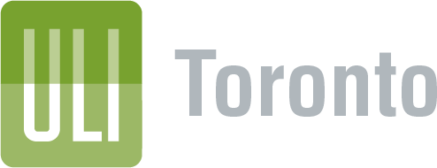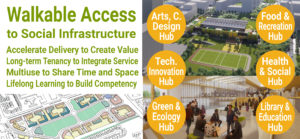Session 2: Design-In Social Equity
Delivering Urban Community Hub and Walkable Mixed-Income Neighbourhood
The Challenge and Opportunities
Within 5 years, there will be 40,000+ people living in Uptown Hurontario-Steeles. The current model is insufficient to building a socially equitable, complete community. The on-the-ground community needs are challenging to understand and quantify. Social infrastructure doesn’t come online at the same time to keep pace with population growth. Facility formats are auto-dependent, disconnected, difficult to walk to, and do not foster social networks. How can we improve on the process and resource allocation for timely delivery as the neighbourhood comes into being?
In Peel Region, 75% of children do not walk to school. Over 60% of the population is obese or overweight. Pandemic has also revealed the limitation of auto-oriented, single-use facilities’ ability to deliver services to residents and businesses effectively, and the psychological impact of social isolation.
Since 2020, the City has experienced a high volume of high-density mixed-use development proposals along rapid-transit served areas. This presents an opportunity for the City to take a proactive role to deliver complete, walkable, healthy, family and transit-oriented communities that can increase Brampton’s competitiveness through retaining and drawing talents to these areas.
The recently released 2021 Census shows Brampton’s growth represents 90.2% of the net population growth within the Region of Peel between 2016 and 2021.
Background
The Council endorsed Brampton 2040 Vision envisioned the “community hub” to provide a one-stop offering of facilities for recreation, education, health and social cohesion that promote sharing and changeable s circumstances shift. The Vision 2040 also envisioned Brampton as a “City By-design” that declares design excellence for public projects to contribute to a well-designed city that draws talent, wealth and competitive edge at the global stage.
Under the direction of 2018-2022 Term of Council Priorities, an Urban Community Hub Study was initiated to consider opportunities to improve effective delivery of services, particularly in intensification areas along rapid-transit routes. Design concepts were completed that offer pragmatic solutions to address urban challenges including health, education, economics, equity, inclusion and post-COVID recovery. The concepts were developed in collaboration with stakeholders including Brampton Library, Peel District School Board, Peel Public Health, Peel Social Services, Sheridan College, Toronto Region Conservation Authority and the Credit Valley Conservation Authority.
In October 2021, Brampton City Council endorsed the ‘Urban Community Hub Design Concepts’ and initiation of ‘Uptown Hub’ pilot at the Uptown Brampton fast growing community, with the goal to deliver the facility and begin operation by 2027. Key components of ‘Uptown Hub’ include:
- Health and Social Hub with clinics, agency spaces, exhibition and meeting venues;
- Library and Education Hub with elementary school, daycare, library & study space;
- Recreation and Food Hub with community kitchen, culinary and pop-ups space, gymnasium and dance studios, community lounge and event space;
- Arts, Culture and Design Hub with performance and multipurpose exhibition venue, city-building design centre, creative industries agency space, pop-up program space, cultural workshops, non-profit showrooms and opportunity for an African Canadian Economic and Cultural Village;
- Technology and Innovation Hub with lecture hall and multipurpose event venue, co-work space and meeting rooms, start-ups and accelerators mentoring space;
- Green and Ecology Hub with urban agriculture eco-gardens, green infrastructure and district energy connections, outdoor fitness and multi-use sports court, ice skating and fountain square, outdoor play and event space, dog leash-free area and multipurpose community park.
Alignment with Peel Region and Provincial Goals
The Uptown Transit Oriented Communities and ‘Uptown Hub’ pilot aligns with Peel Region’s Community for Life 20-year Vision and Public Health, Social Services and School Boards’ goals. It also aligns with multiple provincial goals and is an effective way to implement the Provincial Growth Plan, deliver complete communities and amplify the value of provincial investments in Transit-Oriented Communities. Key alignment includes:
- 2020 Provincial Policy Statement that directs co-locating public facilities in community hubs to facilitate service integration, enhance health and social well-being, deliver strong and livable communities, improve access to transit and active transportation, and demonstrate resilient to climate change;
- 2020 Growth Plan that indicates community hub as a ‘major trip generator’ that expand convenient access to public service, and directs investments in public facilities such as libraries and schools to be planned and located to keep pace with changing needs; and
- 2020 Transit-Oriented Communities that mandates catalyzing complete communities, providing positive value capture, and increasing access to transit. Currently, the Transit-Oriented Communities program covers the area surrounding light rail transit stations and GO stations.
Alignment with ‘On-the-ground’ Needs
In November 2020, the City engaged the Canadian Urban Institute to undertake a research and engagement project to understand the local “on-the-ground” needs in Uptown. Using CUI’s national research and action campaign on post-COVID recovery, the study recommends a cross-sector mobilization effort, with focus on:
- Addressing the needs of youth, small businesses, and racialized population;
- Addressing the needs of entrepreneurs and those in the informal economy;
- Taking actions to restore social and economic resilience while drawing new attention to reconciliation and equity; and
- Leveraging ‘Uptown Hub’ to accelerate post-COVID recovery.

